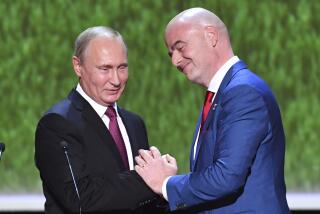WORLD CUP ’94 / 21 DAYS AND COUNTING : Moving Up : African Teams Gaining Recognition; Nigeria Strongest of Three Entries
- Share via
Sixty years have passed since Abdel Rahman Fawzi of Egypt wrote his name into the history of the World Cup.
That was in Italy in 1934, when Egypt became the first African country to take part in the tournament. It was a brief appearance, a 4-2 loss to Hungary at Naples that sent the Egyptians home right away. But not before Fawzi had scored two goals to become the first African to score in the World Cup.
Six decades later, another African is considered a good bet to win the scoring title in World Cup ’94.
Few American fans may have heard of Rachidi Yekini, but if Nigeria lives up to its potential in this tournament, Yekini will quickly become just as well known as Cameroon’s Roger Milla in Italia ’90.
This is the first World Cup in which three African countries will be participating,
Cameroon’s excellent performance in Italy four years ago having earned the continent a third berth. The three nations that qualified are Nigeria, Cameroon and Morocco.
Of the three, Nigeria is clearly the one with “most likely to succeed” stamped on its passport.
Cameroon is in chaos, its preparations for the World Cup thrown into confusion by a lack of funds and constant political interference. Morocco doesn’t have much of a team and is expected to struggle.
But Nigeria, that’s a different story.
“We’ve proven we’re a good side with great individual players,” the team’s winger, Victor Ikpeba, said after Nigeria had won the African Nations Cup in Tunisia in April. “There is so much talent we could form two different sides and still be the best in Africa.”
Clemens Westerhof, Nigeria’s oft-embattled Dutch coach of the past five years, is somewhat more restrained in his enthusiasm. “My only aim is to produce results that will surpass Cameroon at the last World Cup finals,” he said.
That in itself will be no small feat. After upsetting defending world champion Argentina in Milan in the opening match of the Italia ’90 tournament, Cameroon went all the way to the quarterfinals. Only an unlucky 3-2 overtime loss to England at Naples prevented it from reaching the semifinals.
Cameroon’s showing was the best ever by an African country in the World Cup, and its open and attacking style earned favorable reviews in a tournament that was almost devoid of adventurous play.
No player typified this fun-loving spirit better than Milla, who at 38 showed he could still dance through defenses with ease. His hip-swinging post-goal celebratory dances with the corner flag drew smiles from one end of Italy to the other.
Milla, Africa’s player of the year in 1976 and 1990, is 42 now but still dreams of being included in Cameroon’s World Cup team for 1994. Henri Michel, the country’s French coach, is noncommittal, recognizing Milla’s popularity with the fans and especially President Paul Biya, but also knowing that age has caught up with the player known as “the Old Lion.”
Not that Yekini, Milla’s heir apparent as Africa’s World Cup star, is exactly a youngster.
At 30, Yekini is closer to the end of his playing career than the beginning. But his credentials as a striker are impressive. His eight goals in World Cup qualifying play for Nigeria made him the top goal-scorer in Africa’s qualifying tournament. He scored another five in Tunisia to win the goal-scoring title at the African Nations Cup, the continental championships.
And he is just as prolific with his club team. Although playing for unfashionable Victoria Setubal, he leads the Portuguese League in scoring with 21 goals so far this season.
It’s small wonder that Nigeria’s Super Eagles believe they will fly high this summer.
There is a lot more than national pride at stake, however. Cameroon earned Africa a third World Cup berth. Nigeria has the possibility of earning it a fourth or even fifth spot in the quadrennial world championships.
Now that FIFA, world soccer’s governing body, has decided to expand the tournament to 32 teams in 1998, there is competition to see just how the six continental confederations divide those extra eight places.
The Europeans have offered a plan that gives Africa, Asia, CONCACAF (the North and Central American and Caribbean region) and South America each one additional place while reserving the other four places for the continents that provide the four semifinalists in this World Cup.
Potentially, all four could go to Europe, which has not escaped the notice of the Africans and Asians. Both continental groups would like two extra places rather than one.
Much will depend, therefore, on how well Nigeria, Cameroon and Morocco do on Africa’s behalf this summer and on how well South Korea and Saudi Arabia fare in the cause of Asia. Morocco and Saudi Arabia are in the same group, adding a little spice.
Cameroon is grouped with tournament favorite Brazil, Sweden and Russia. Russia--then the Soviet Union--defeated Cameroon, 4-0, in the World Cup four years ago and is unlikely to be any easier to deal with this time around. Milla or no Milla, Cameroon has a tough task ahead.
So does Morocco. Besides the Saudis, the Moroccans must play the Netherlands and Belgium in the first round. The best hope for Coach Abdallah Blinda’s team is a third place, which probably will require defeating Saudi Arabia.
That leaves Nigeria carrying Africa’s banner. The Super Eagles have a potentially less-intimidating opening round. They play, in order, Bulgaria, Argentina and Greece. Bulgaria has yet to win a World Cup match in 16 attempts, Argentina’s defense is a shambles and the Greeks bear gifts of three points for each of their World Cup opponents.
In other words, the Nigerians have a chance to do more than just well. They could win the group.
All of which leaves Issa Hayatou with somewhat mixed emotions.
Hayatou, 47, is president of the Confederation Africaine de Football (CAF), soccer’s governing body on the continent. He is also a member of the FIFA executive committee and is regarded as being in line for the FIFA presidency one day.
He is also from Cameroon, which leaves him hoping that Nigeria succeeds, but not at Cameroon’s expense.
During Hayatou’s tenure with CAF, African teams have done increasingly well in international competition. In addition to Cameroon’s quarterfinal appearance in the World Cup in 1990, Ghana won the Under-17 World Championship in Italy in 1991 (Nigeria had won in 1985 and finished second in 1987) and finished second in the Under-20 World Championship in Australia in 1993. Ghana also won the bronze medal in the 1992 Olympic Games at Barcelona, the best Olympic performance by an African team.
And in the first All-African final in a world championship tournament, Nigeria defeated Ghana in the 1993 Under-17 World Championship in Japan last year.
Clearly, Africa’s youth teams are among the best in the world.
According to Hayatou, the sport in Africa is “in evolution,” and with the exception of a few national federations, the level of play is rising throughout the continent.
“As a confederation, we are second only to Europe,” Hayatou said, adding that of CAF’s 52 member nations, “there are at least 20 countries that play at a very good level--higher than teams from Asia, Oceania and Central America.
“As far as South America is concerned, there are only two countries, Argentina and Brazil, that are strong. The others are at the same level as those in Africa.”
Hayatou said there are more than 500 Africans playing professionally in Europe, including such world-class stars as Ghana’s Nii Lamptey in the Netherlands and Anthony Yeboah in Germany; Liberia’s George Weah in France and Yekini in Portugal.
“African football is progressing and improving, and we’re going forward to seriously challenge Europe,” he said. “The problem in Africa is that we don’t have enough financial means and material and sports infrastructure, and therefore we are handicapped. If those conditions were achieved, we could have a very worthwhile role in the worldwide soccer family.”
The return of South Africa to the CAF and FIFA fold probably has hastened the day when Africa plays host to a World Cup.
For the immediate future, however, all attention is on 1994 and the hope that before the World Cup goes into Africa, a World Cup winner can come out of Africa.
Africa’s History World Cup
RECORDS
Country W L T GF GA Cameroon 3 2 3 8 10 Algeria 2 3 1 6 10 Morocco 1 3 3 5 8 Tunisia 1 1 1 3 2 Egypt 0 2 2 3 6 Zaire 0 3 0 0 14 Total 7 14 10 25 50
RESULTS
ALGERIA
Year Result, Opponent Score 1982 Beat West Germany 2-1 1982 Lost to Austria 2-0 1982 Beat Chile 3-2 1986 Tied Northern Ireland 1-1 1986 Lost to Brazil 1-0 1986 Lost to Spain 3-0 CAMEROON 1982 Tied Peru 0-0 1982 Tied Poland 0-0 1982 Tied Italy 1-1 1990 Beat Argentina 1-0 1990 Beat Romania 2-1 1990 Lost to Soviet Union 4-0 1990 Beat Colombia 2-1 1990 Lost to England 3-2 EGYPT 1934 Lost to Hungary 4-2 1990 Tied Netherlands 1-1 1990 Tied Ireland 0-0 1990 Lost to England 1-0 MOROCCO 1970 Lost to West Germany 2-1 1970 Lost to Peru 3-0 1970 Tied Bulgaria 1-1 1986 Tied Poland 0-0 1986 Tied England 0-0 1986 Beat Portugal 3-1 1986 Lost to West Germany 0-1 TUNISIA 1978 Beat Mexico 3-1 1978 Lost to Poland 1-0 1978 Tied West Germany 0-0 ZAIRE 1974 Lost to Scotland 2-0 1974 Lost to Yugoslavia 9-0 1974 Lost to Brazil 3-0





